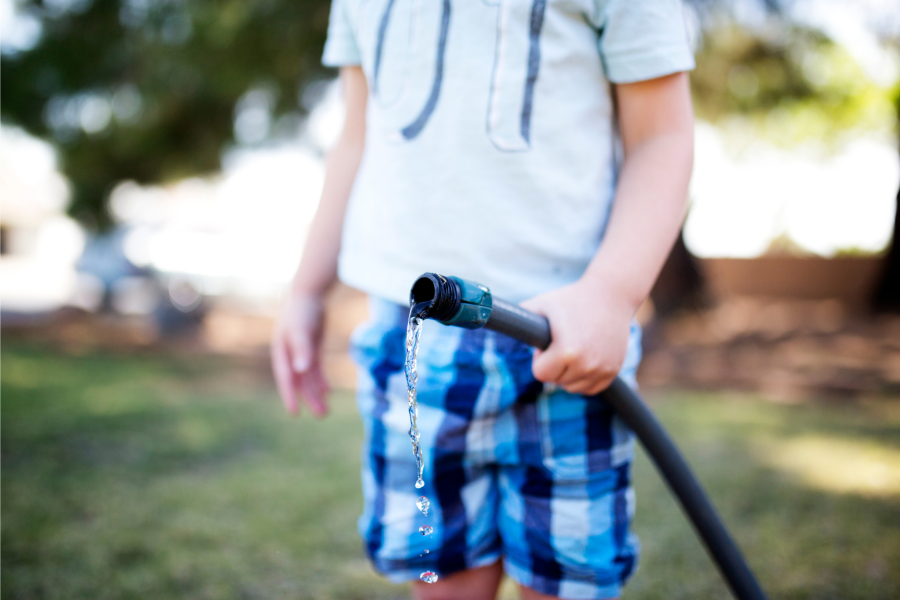As our technicians complete their initial property visits, they’ve noticed a subtle issue that is destroying properties – unregulated irrigation. Many homeowners leave their irrigation systems running unchecked, leading to overwatering, particularly during rainy periods. This can result in problems like “wet feet” for ornamental trees and shrubs. The term “wet feet” refers to when the soil around roots is saturated with water, leading to a myriad of issues. We’re here to help address these irrigation challenges and ensure your landscape thrives.
You might be wondering why it’s so important to monitor the water levels of your landscape. Soil moisture is key to healthy thriving plants which are more resilient to pests and diseases. We know it’s tempting to hose down your plants on hot spring days, but showing our trees too much love can be just as bad!

Importance of Maintaining Proper Soil Moisture
- Minimizes Environmental Stress: Proper soil moisture levels help plants withstand environmental stressors such as heat waves, droughts, or heavy rains. Proper moisture ensures that plants can maintain optimal physiological functions, reducing the risk of wilting, nutrient deficiencies, and other stress-related issues.
- Managing Disease Problems: Maintaining balanced soil moisture levels helps prevent disease outbreaks and promotes overall plant resilience.
- Promoting Plant Growth: Adequate water availability supports nutrient uptake, leading to vigorous growth, lush foliage, and robust root systems. Proper moisture levels also contribute to flowering and fruiting, enhancing the overall vitality of plants.
- Improving Aesthetics: Well-maintained soil moisture levels contribute to the aesthetic appeal of landscapes and gardens. Healthy, well-hydrated plants exhibit vibrant colors, turgid foliage, and lush appearance, enhancing the visual appeal of outdoor spaces.
- Preventing Wet Feet: Overly saturated soil can lead to “wet feet” or waterlogged conditions, which can suffocate plant roots and lead to root rot.
- Increasing Fire Resistance: In fire-prone areas, maintaining proper soil moisture can contribute to fire resistance. Moist soil acts as a natural barrier, reducing the flammability of vegetation and creating a buffer zone against wildfires.
The Problem with Watering
One key consideration is adjusting irrigation practices based on weather conditions. Different regions experience varying weather patterns, from dry spells to heavy rains, requiring tailored irrigation schedules to avoid under or overwatering. Drip irrigation during periods of low rainfall is often all a mature tree needs!
While short bursts of watering may seem convenient they often result in inadequate moisture penetration. This shallow watering method only wets the turf’s surface, leading to shallow root growth and increased vulnerability to drought stress. Proper irrigation techniques involve deep, infrequent watering sessions that encourage deep-root development.
The type of plant and soil composition play crucial roles in soil moisture retention. Additionally, some soils retain water better than others, influencing how frequently and deeply plants should be watered. Many irrigation systems are designed primarily for lawn care, not for adequately meeting the needs of trees.
Signs of Poor Irrigation
The practice of overwatering or underwatering a plant results in similar symptoms. This makes it harder to distinguish what the issue is.
Overwatering vs Underwatering
| Wilting | Wilting | ||
| Yellowing Leaves | Yellowing Leaves | ||
| Slow Growth | Slow Growth | ||
| Leaf Drop | Leaf Drop | ||
| Root Rot | Dry Soil | ||
| Mold or Mildew | Cripsy or Curling Leaves |
We understand that for many homeowners it can be a headache to decipher what is at the root of your plants’ health issues. With the help of RTEC Treecare, you can rely on us to determine what your plants need to stay healthy.
RTEC Treecare Can Help
Our Premier or Plus Canopy Protection Programs are exactly what you need to ensure your trees and shrubs are taken care of all year round.
With regular visits from Plant Health Care Technicians, we will monitor your plants and notify you if we notice signs of poor watering. We will ensure that your landscape’s irrigation needs are properly assessed and adjusted based on weather conditions, soil types, and plant species.
On the other hand, if your soil is too dry, we can apply our liquid vitamin, Bio-Stimulants, through subsurface applications. This means there is little erosion, reduced surface evaporation, and soil aeration while delivering the product.
By enrolling in the Plus or Premier tiers, you can benefit from expert guidance and proactive measures to maintain optimal soil moisture levels, preventing the risks associated with overwatering and underwatering.



